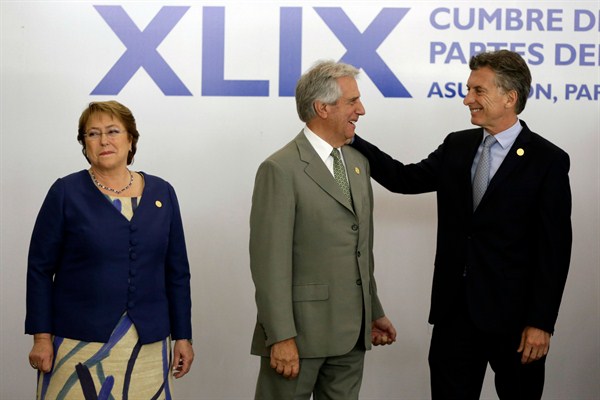For several regional observers and much of the media, the string of conservative electoral victories from Argentina to Venezuela late last year was the last nail in the coffin of Latin America’s left. With Brazil’s leftist government floundering and other signs of discontent among its neighbors, leftism’s appeal appears to be on the decline in the region. But despite setbacks, it’s too soon to declare the left dead in Latin America, given the perseverance of more mainstream leftist governments and ongoing socio-political and economic realities in a region still defined by huge inequality.
Admittedly, 2015 did not end well for many socialist stalwarts in Latin America. Venezuela’s opposition handily defeated the ruling United Socialist Party of Venezuela (PSUV) in elections on Dec. 6, clinching two-thirds of the seats in the National Assembly. Venezuelans were fed up with the disastrous economic measures that Hugo Chavez and his successor, Nicolas Maduro, have undertaken in the past 17 years. In the first runoff round of presidential voting in Argentina’s history in November, Mauricio Macri of the center-right party Cambiemos, or “Let’s Change,” narrowly defeated Daniel Scioli, the candidate of a coalition spearheaded by the outgoing leftist president, Cristina Fernandez de Kirchner. A month earlier, Guatemalans elected comedian Jimmy Morales of the conservative National Convergence Front as their president. Also in October, Colombia’s left-leaning Alternative Democratic Pole lost Bogota’s mayorship—the country’s second-most-important executive seat after the presidency—to Enrique Penalosa, who ran as the candidate of the center-right-leaning Radical Change party.
Warnings about the Latin American left’s imminent fall began circulating around Chavez’s death in 2013, when analysts predicted that it would be difficult for anyone from his ruling party to make up for his absence from national affairs—and from Venezuela’s airwaves. At first, though, Maduro got by, even though he had to rely on heavy doses of Chavez’s image and rhetoric to defend Chavez’s self-described leftist “Bolivarian Revolution.” But as the economy worsened at home, driven down by falling oil prices, Venezuelans grew weary of long lines to purchase even basic food staples, which made the growing corruption, skyrocketing inflation and tight control over foreign currency exchange more intolerable.

